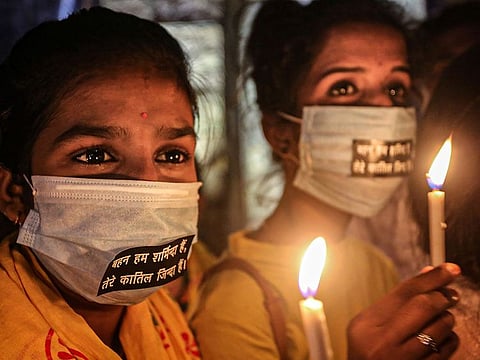Why caste system and untouchability are India’s biggest shame
Death of a lower-caste boy shows tough laws have not erased the abhorrent practice

As India celebrated 75 years of independence last week, the death of a nine-year-old Dalit (lower caste) boy in Rajasthan at the hands of his “upper caste” teacher was a blot on our conscience. In the police complaint, the family says the boy was brutally beaten by the teacher in July for daring to drink water from a pot meant for “upper castes”.
The child was badly injured, bleeding internally. The family moved him to seven hospitals before he died in an Ahmedabad hospital.
Imagine a child — a CHILD — is beaten and killed in 21st-century India for being thirsty and taking a drink of water, because he is not considered “pure” enough to drink from the same bowl. We should hang our heads in shame.
The caste system is undoubtedly India’s biggest shame.
Casteism is all pervasive in India. Even today, Dalits face the worst kind of social ostracism, prejudice and humiliation in places they live or study.
Speaking to me on NDTV last week about the child’s death, former Lok Sabha speaker Meira Kumar moved many to tears as she talked about the rampant casteism that she and her father, a former deputy prime minister and Dalit leader, faced despite their relative privilege. “Seventy-five years after Independence, India has not changed. Nothing has changed,” she said.
“I asked my father. ‘Why did you fight for freedom? This country did nothing for you. It has given nothing to you or your ancestors’. He said, ‘Free India is going to change. We will have a casteless society’. Glad he’s not there now,” Kumar said.
When her father Babu Jagjivan Ram, a deputy prime minister in 1978, went to unveil the statue of Sampurnanand, he was humiliated. “‘Jagjivan, chamar, go away,’ they said. And they washed the statue with Ganga Jal. Because it was polluted. So you see, the caste system embraces everyone,” Kumar recalled.
Laws have failed to curb crimes against Dalits
India’s laws forbid untouchability. This was mandated from the time we adopted our Constitution, where untouchability was declared a punishable offence. A tougher law was passed by Parliament later, called the Scheduled Castes and Scheduled Tribes (Prevention of Atrocities) Act, 1989. This Act defines various atrocities against SC/STs in great detail and allows special courts to deal with any offences.
Despite this, crimes against Dalits have only increased. According to official data from India’s National Crime Records Bureau, crimes against Dalits rose significantly during the year of the pandemic in 2020. A Scheduled Caste (SC) person faced a crime every 10 minutes in India, an increase of 9.4 per cent from the previous year. Crimes against Scheduled Tribe (ST) communities increased by 9.3 per cent.
Casteism is all pervasive in India. Even today, Dalits face the worst kind of social ostracism, prejudice and humiliation in places they live or study. Some years ago, not far from the birthplace of Dr Bhim Rao Ambedkar (architect of the Indian Constitution) in Madhya Pradesh, a Dalit bridegroom was attacked for riding a horse and burning crackers during a wedding procession. There have been many similar incidents in other states.
Look at corporate India. Hardly any non “upper castes” make it to top positions. A 2012 study by Canada-based researchers said that 93 per cent of board members in India’s top 1,000 businesses belonged to upper castes. In 2020, California regulators sued Cisco Systems, saying an engineer faced discrimination at the company’s Silicon Valley headquarters because he is a Dalit.
Also Read: Meet the Muslims who fought for India
Shaken by the Cisco lawsuit, some top tech giants, especially Apple, are taking a stand against the caste system in their Indian workforce. Apple updated its general employee conduct policy in 2020, prohibiting discrimination based on caste, which it added alongside existing categories such as race, religion, gender, age and ancestry.
Reuters reports that the inclusion of the new category goes beyond US discrimination laws, which do not explicitly ban casteism. The news agency found several companies do not specifically reference caste in their main global policy, including Amazon, Dell, Facebook owner Meta, Microsoft and Google. The companies told Reuters that they have zero-tolerance for caste prejudice and, apart from Meta, which did not elaborate, said such bias would fall under existing bans on discrimination by categories such as ancestry and national origin on policy.
In 2017, a Dalit scholar at Hyderabad University, Rohit Vemula, died by suicide after he was suspended over a complaint filed by the RSS student wing, the AVBP. His 25,000 rupee fellowship was suspended. Unable to meet the expenses, Vemula took his life, triggering a huge political storm in the country. I am still haunted by his suicide note, where he said, “ My birth is my fatal accident”.
We must hang our heads in shame.




